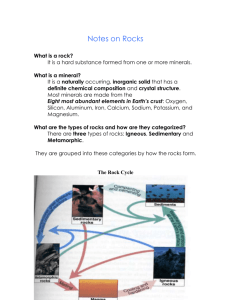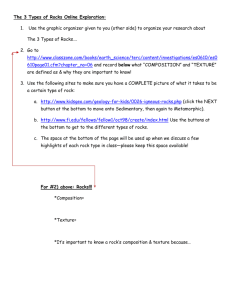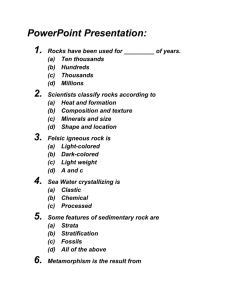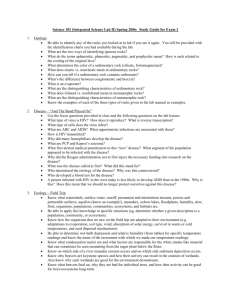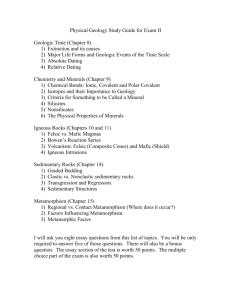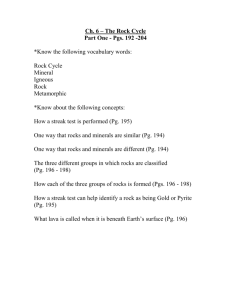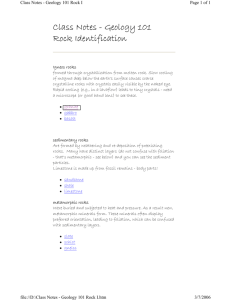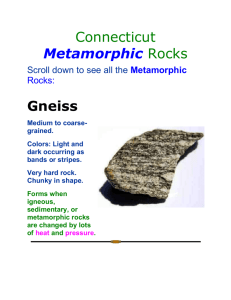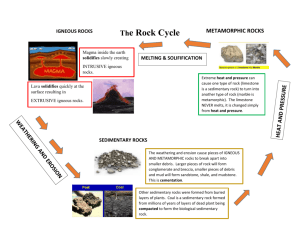SEDIMENTARY ROCKS
advertisement
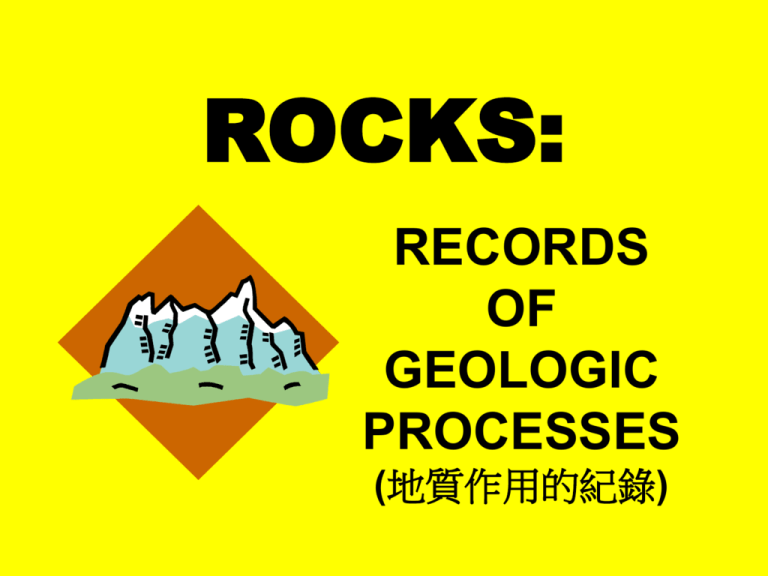
ROCKS: RECORDS OF GEOLOGIC PROCESSES (地質作用的紀錄) ROCK, by definition, is composed of an aggregate of minerals (原素) (礦物) (岩石) • Appearance of a rock is related to: 1. Mineralogy = types and relative proportions of constituent minerals 2. Texture = size, shape and orientation of mineral grains • These features relate to the origin and history of the rock. When many rocks are understood, the geologic history (and tectonic setting) of a region can be inferred. Where do we see rocks? • Not on the surface of course! • They are at depth in most places covered by soil and regolith (風化層). Three general rock types: 1. Igneous - formed by solidification of molten rock (>700°C) 2. Sedimentary - formed as burial products of sediments, on land or sea 3.Metamorphic - formed by transformation in the solid state of pre-existing rock due to changing pressure and temperature. (火成岩) (沉積岩) (變質岩) Sedimentary rocks comprise a majority of the surface of the Earth, but are a minor volume of the total volume of the crust. IGNEOUS ROCKS (火成岩) Definition: A rock formed by the solidification of magma (molten rock) Igneous environments IGNEOUS ROCKS (火成岩) • Can be intrusive (crystallizing below the surface of the Earth) or extrusive (crystallizing at the surface of the Earth) • Textures in igneous rocks relates to the composition of the magma, rate of cooling of the magma and any flow features of the magma • Extrusive (噴出) rocks - rapid cooling, therefore fine-grained or glassy; some surface flows • Intrusive (侵入) rocks - slower cooling, therefore coarser grained; flow features possible IGNEOUS ROCKS (火成岩) SEDIMENTARY ROCKS (沉積岩) Definition: A rock formed by the accumulation and cementation of mineral grains by wind, water or ice transportation to the site of deposition, or by chemical precipitation at the site. Typical sedimentary depositional environments • Sedimentary rocks - generally characterized by bedding i.e. parallel layers of sediments • Textures of sedimentary rocks relate to the manner of sediment transport and deposition e.g. high vs. low velocity transport • This is an interface between the atmosphere, hydrosphere and lithosphere. SEDIMENTARY ROCKS (沉積岩) • Types: 1. Clastic - physically deposited sedimentary particles (clasts - broken rocks, remains or products of animals or plants) transported and laid down by running water, wind or ice. Generally silicate minerals. 2. Chemical and biochemical sediments -chemical precipitation of dissolved components of rocks at the depositional site e.g. halite, calcite 3. Mixtures of both of the above • Lithification of sedimentary rocks – hardening into a solid rock due to compaction and cementation METAMORPHIC ROCKS (變質岩) Definition: A rock whose original mineralogy, texture, or composition has been changed by the effects of pressure, temperature, or the gain or loss of chemical components. • Occurs between temperatures of roughly 250°C (end of sedimentary lithification processes) and melting of the rock (>700°C) Contact and regional metamorphism at plate-collisional mountain ranges Burial metamorphism in deep sedimentary rocks Cataclastic metamorphism along faults Contact and regional metamorphism at subduction zones Hydrothermal metamorphism at mid-oceanic ridges METAMORPHIC ROCKS(變質岩) • General classification of type of metamorphism relates to location of heat source 1. Regional metamorphism - heat source in not apparent, but generally higher; associated with mountain building episodes extending over large regions 2. Contact metamorphism - heat source is apparent i.e. associated with intrusion of a magma that "cooks" the surrounding rocks • Textures relate to the pressure, temperature and deformational history of metamorphic rock Metamorphic environments THE ROCK CYCLE (岩石循環) • Inter-relationships among the three rock types • The rock cycle is directly related to plate tectonics (板 塊構造) - in turn, the rocks that we currently see can infer tectonic conditions in the past. • This is an interaction among the atmosphere, hydrosphere, lithosphere and asthenosphere (the mantle layer) and is unique to Earth Recommended Web-sites: Chinese web-site: 岩石圈 English web-sites: Discover How Rocks Are Formed Rocks For Kids Your Gemologist Rockdoctors Guide to Minerals, Igneous, Metamorphic, and Sedimentary Rocks
